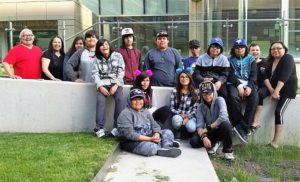Kingfisher Lake students visit Toronto

By Barb Nahwegahbow
TORONTO—Shaun Quequish, a Grade 8 student from Kingfisher Lake First Nation, had one word to describe Toronto – confusing. He and 11 of his Grade 7 and 8 classmates had a week-long whirlwind trip to Toronto recently.
The students were accommodated at a University of Toronto residence downtown and Shaun said he could hear the sirens from firetrucks, police cars and ambulances from his window high up.
“It’s never quiet here,” he said.
Kingfisher Lake First Nation is an Oji-Cree community with a registered on-reserve population of 411. It’s located 350 kilometers north of Sioux Lookout, Ontario. The community is accessible by air all year-round, by waterways during summer, and ice roads during the winter months. The first language is Oji-Cree, a mixture of Cree and Ojibway.
“This trip has been an adventure,” said their teacher Matthew Everts.
Originally from Innisfil near Barrie, this is Everts’ second year at Kingfisher Lake. There’s a trip for the Grade 7 and 8 students every two years, he said and the toughest challenge is the fundraising. Their goal this year was $40,000, but they actually raised $47,000.
Funds are raised a number of ways, said Everts, through community events, a government grant and this year they did online crowdfunding.
“With our Go Fund Me account we had at least 12,000 people—complete strangers—donate to our trip to Toronto,” he noted.
The week went quickly for the young students and their four chaperones. A Blue Jays game, Niagara Falls and the Maid of the Mist, shopping malls, Canada’s Wonderland, Ripley’s Aquarium, and the Royal Ontario Museum were just some of the destinations on their packed agenda.
“[Toronto is a] whole different story,” said Brandon Baxter. “[There’s] a lot more things to do than on a reserve.”
These things-to-do included riding on elevators which was Brandon’s very favourite thing. His second favourite was the trip to Canada’s Wonderland and the arcade.
For Shaun Quequish, the Blue Jays game topped his list. He’s a big fan.
“The kids had so much fun with the Blue Jays game,” said Everts. “They were cheering so much, most of them ended up losing their voices by the end of the game!”
Rhianna Sainnawp quietly said she would tell people back home that the trip “felt nice and awesome”.
“I wanted to stay here a little while longer,” said Raine Bighead. “But it’s expensive.”
He said he spent an average of $100 a day.
The trip to Niagara Falls was the highlight for Kayleigh Winter, but not because of the Falls.
“What I liked the best was seeing Mr. G., my teacher from last year,” she said. “But I liked the shopping, too.”
This wasn’t the first time Frances Mekanak has chaperoned the school trip. A former teacher’s assistant, this is her third trip. The kids are so excited about being in Toronto, she said, including her two boys.
“They’re having fun here,” she said. “I haven’t heard any of them saying they want to go home.”
The young students have to leave home for high school, either to Thunder Bay or Pelican Falls.
“Some of them drop out,” noted Makenak. “They’re lonely and missing their parents. The parents can’t afford the air fare to visit their children.”
Sending their children to Thunder Bay is a scary prospect for the parents, said Matthew Everts because of what’s going on there.
“Some of them are only 13-years-old and it’s a big stepping stone for them to leave their home and family,” added Everts.
Lorraine Pitawanakwat and her husband Kenn from Wikwemikong Unceded Territory were tired out from their week chaperoning. Lorraine is currently teaching kindergarten at Kingfisher Lake and has taught there for a number of years.
The week was tiring, she said, but it’s been a good experience for the youth. The trip is intended to reward the students, but also to act as a motivator, to open their eyes to the world beyond Kingfisher Lake. It’s up to the leadership now to support these young people to finish their education, said Kenn.


